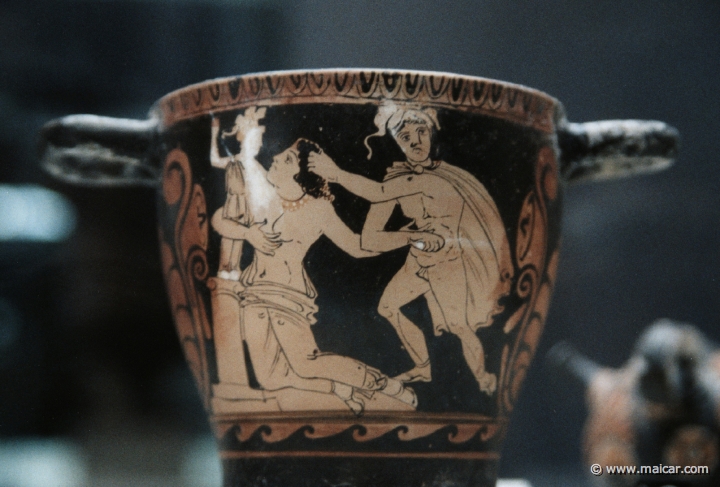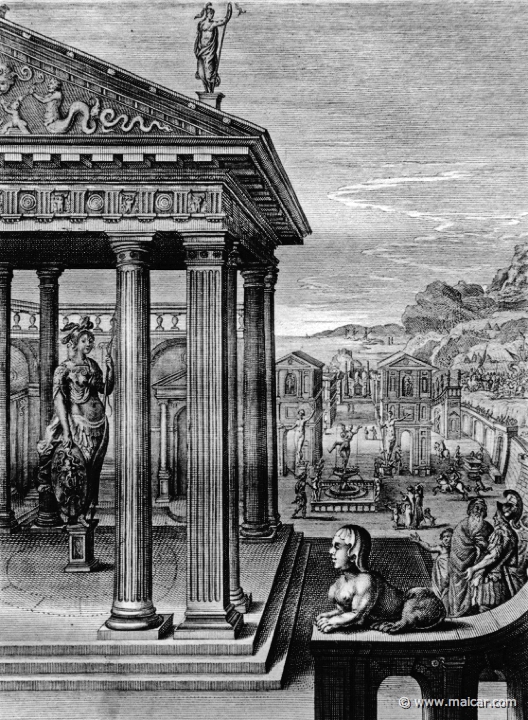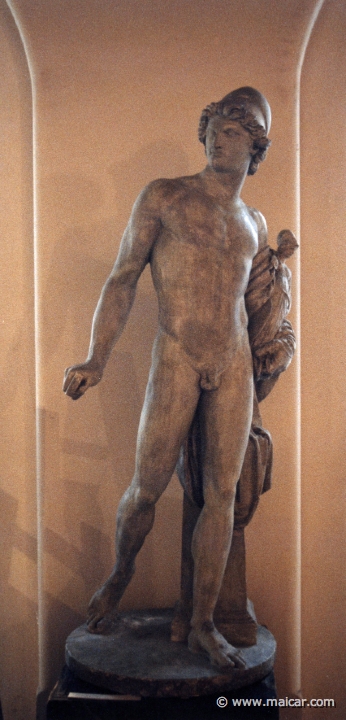|

|
The statue of Athena to which Cassandra clung just before Ajax 2 dragged her away should not be the Palladium, since Odysseus and Diomedes 2 stole it before the fall of Troy. 5727: Ajax, Cassandre et le Palladion. Skyphos. Campanie "peintre de Capoue 7531". 350-330 avant J.-C. Musée d'Art et d'Histoire, Genève.
|
|
|
"Whether it was Diomedes, or the guileful Ulysses, or
Aeneas, they same someone carried it off;
the culprit is uncertain; the thing is now in Rome:
Vesta guards it, because she sees all things by her
light that never fails" (Ovid, Fasti 4.433).
|
|
The Palladium is the wooden statue that fell
from heaven and was kept at Troy; for as long as it was
preserved, the city was safe.
Death of Pallas 3
Athena was reared by
Triton (the son of Poseidon and Amphitrite) together with his own daughter Pallas 3. The two girls, they say, were playmates, and once, as they were practising the arts of war and Pallas 3 was about to strike a blow, Zeus, fearing for his
daughter, interposed the aegis to protect Athena; and when Pallas 3, being caught by surprise, looked up, Athena hit her, and she
fell wounded and died.
Athena makes the image
In order to calm her grief, Athena made a three cubits high wooden statue in the likeness of Pallas 3, with the feet joined together, and holding in its right hand a spear, and in the left a distaff and spindle. And wrapping about its breast the aegis that had frightened her friend, she set the image up beside Zeus, and
honoured it in Heaven.
Zeus throws it away
Later Zeus seduced Electra 3, one of the PLEIADES, and since she, escaping from him, took refuge at the image, the god threw the Palladium into the Troad. Some have said that, along with the Palladium, Zeus cast Ate down to the
world, seizing her hair and whirling her round his
head, and swearing that she should never set foot
in Olympus again. For Zeus held Ate responsible for the blindness with which
he had taken a certain oath.
Ilus 2 finds it
Afterwards Ilus 2, son of Tros 1 (eponym of the Trojans), son of Erichthonius 1, son of Dardanus 1, son of Zeus and Electra 3, came to Phrygia where he, after taking part in the games that were held by the king, won a victory in wrestling. As a prize, Ilus 2 received fifty youths and fifty maidens. In addition, the king, following an oracle, gave him a cow, asking him to found a city wherever the cow should lie down. Ilus 2 then went away, and on seeing the cow resting at the hill of Ate, he prayed to Zeus that
a sign might be shown to him. It was then that he
saw the Palladium, fallen from heaven and lying
before his tent, being blinded by it, since the
Palladium was not to be looked upon by any mortal.
But later, after having made offerings, he
recovered his sight, and built on the same spot the
city which he called Ilium
(Troy) with a temple for the Palladium. Or else, as others say, the Palladium fell from Heaven and took its proper place as Ilus 2 was building the temple, which was complete except for the roof.
The daughter of Pallas 8
Still others have said that when Chryse 3 (daughter of Pallas 8) married Dardanus 1 in Samothrace (the island in the northern Aegean Sea), she brought for her dowry the Palladium and other gifts of Athena (hence Palladia), including secret symbols of the gods, in whose mysteries she had been initiated. Dardanus 1 then built a temple in Samothrace where he performed mysteries in the gods' honour while keeping their names secret.
|

|
Another version of the Palladium: an object difficult to wrap and hide.
8606: Bernard Picart (1673-1733): The Palladium. Fabeln der Alten (1754).
|
|
Dardanus 1
Later Dardanus 1, grieved at his brother Iasion's death, left Samothrace, and taking with him the Palladia, came to the country at foot of Mount Ida where the Teucrians dwelt (i.e., those ruled by Teucer 2, son of Scamander 1, one of the RIVER GODS), founded a city, and called it Dardania after himself. Concerning the holy objects he had brought, Dardanus 1 received the following instruction:
"In the town
you build worship undying found to gods ancestral;
guard them sacrifice, adore with choirs. For while
these holy things in your land remain, Zeus' daughter's gifts of old bestowed
upon your spouse, secure from harm your city shall
abide forevermore." (Dionysius of Halicarnassus, Roman
Antiquities 1.68ff.).
On account of this prophecy, the Palladium was
regarded as vital for the protection of the city.
Uncertain fate
Now, when Ilus 2 (himself a descendant of Dardanus 1) founded his city, the Palladia were removed from Dardania to Troy, where a temple was built upon the citadel for their preservation. Regardless of their immediate origin (whether brought by Dardanus 1, or found by Ilus 2), the Palladia were looked upon as sent from Heaven, and as pledges of the city's safety. One of these was stolen by the Achaeans during
the Trojan War, and
the rest were brought by Aeneas to Italy, being
otherwise called PENATES. These became the
household gods of the Romans, and were represented
as two youths holding spears. Others have said that
the Achaeans stole a copy, made on purpose to
delude them, and that Aeneas did bring the Palladium to Italy, where it was kept from the time of Numa 3 (the second king of Rome) by the Vestals (the virgins to whom the custody of the fire was committed in the temple of Vesta at Rome and in other cities). But still others have said that only one Palladium ever existed, either found by Ilus 2 at the hill of Ate, or given by Zeus to Dardanus 1, it being the same Palladium that the Achaeans stole. And they argue that Aeneas could not have
occasion to rescue the Palladium when Troy fell, since the
Palladium, had it been at Troy, would have prevented
anyone from taking the city. In any case, the fame
of the Palladium was such that several Palladia
were kept in many cities, throughout antiquity.
Helenus 1 leaves Troy (I)
When in the tenth year of the Trojan War, Paris died, the seer Helenus 1 and his brother Deiphobus 1 quarrelled for the hand of Helen; and when Deiphobus 1 was preferred Helenus 1 left the city and established his residence on Mount Ida. It was then that the seer Calchas declared that
his colleague Helenus 1 was in possession of the oracles that protected the
city of Troy. So Odysseus laid and
ambush and captured the Trojan seer. And after
having displayed this glorious prey in the Achaean
camp, they forced him to tell how Troy could be taken. Helenus 1 then
prophesied on whatever matter they asked,
instructing them to bring the Bone of Pelops 1, to fetch Neoptolemus from
Scyros, to persuade Philoctetes (in
whose power were the Bow and Arrows of Heracles 1) to come
from Lemnos, and also to
steal the Palladium, since while it was within the
walls the city could not be taken.
Helenus 1 leaves Troy (II)
But others have said that Helenus 1 was not
captured but fetched by Odysseus and Diomedes 2, after
having fled from Troy on
account of a crime committed by Paris that he could not
bear. For Paris, in the
course of a truce, treacherously murdered Achilles in the temple
of Thymbraean Apollo,
along with Nestor's son
Antilochus (who otherwise is said to have been
killed in battle, either by Memnon or by Hector 1). And they add
that Paris, not yet sated
of outrages against both gods and men, wished to
throw the bodies of Achilles and Antilochus
to the dogs and birds, being however countermanded
by Helenus 1, who gave order to remove the bodies from the temple and hand them over to the Achaeans. So Helenus 1, having
arrived to the Achaean camp as a suppliant,
explained his acts by declaring that he feared not
death but the gods, and revealed the aforementioned
matters and the truth about the Palladium.
The beggar
|

|
6930: Johan Tobias Sergel (1740-1814): Diomedes carrying the Palladium (1771-74). Konstakademin, Stockholm.
|
|
On hearing the seer's confession, Odysseus, some say,
went by night to Troy, and
leaving Diomedes 2 waiting, disguised himself and entered the city as
a beggar. There he was recognized by Helen, who helped him to
steal the Palladium; and after killing several
guards, he brought it to the ships with the aid of Diomedes 2. When later Odysseus wished to be afforded the arms of Achilles and was
contested by Ajax 1, he
reminded the judges of his deed in his speech,
referring to himself in rhetoric third person:
"Why does
Ulysses dare to go out beyond the sentinels, commit
himself to the darkness and, through the midst of
cruel swords, enter not alone the walls of Troy but even the citadel's top, steal the goddess from her shrine and bear her captured image through the enemy? … On that night I gained the victory over Troy…" (Odysseus to the
judges. Ovid, Metamorphoses 13.340).
… and pointing to the Palladium he concluded:
"… if you do not give the arms to me, give them to her!" (Ovid, Metamorphoses 13.380).
Work of a traitor
Yet others have said that Odysseus and Diomedes 2 learned
from Antenor 1 the
oracle that declared that Troy would be destroyed if
the Palladium were carried outside the city walls.
And having come to the city for negotiations, they
obtained it from Antenor 1. For the latter went to the temple of Athena, and having accosted the priestess Theano 2 (whom others call Antenor 1's wife) with
both threats and promises of reward, obtained from
her the Palladium which he wrapped and sent to Odysseus through
faithful friends or close accomplices.
The Palladium disputed
Following the fall of Troy (which took place soon
after, thanks to the stratagem of the WOODEN HORSE)
contention arose between Ajax 1 on one side, and Odysseus and Diomedes 2 on the
other; yet not because of the armour of Achilles, as some have
said, but because of the Palladium. For Ajax 1 saw himself as the
performer of great deeds, and therefore, he
thought, the Palladium should be his. On the other
hand, Diomedes 2 and Odysseus claimed the
Palladium on the ground that they had themselves
carried it off. When Ajax 1 then argued that it was Antenor 1 who had
carried the Palladium off, themselves having no
troubles, Diomedes 2 yielded, but not Odysseus, who was
finally favored by the Atrides Agamemnon and Menelaus on the ground
of his merits in this particular case only, since
no one dared to put in doubt the deeds of Ajax 1. Yet it was known that they did so because it was
through Odysseus'
intercession that Helen,
whom Menelaus still
loved, had been brought back unharmed; for had the
will of Ajax 1 found its
way, Helen had been dead,
since he, on the verge of the sack of Troy, had proposed that she
should be killed who had caused the death of so
many notable men. The decision of the Atrides
caused unease in the army, which split in two
factions; and when the next day Ajax 1 was found dead out
in the open, Odysseus,
fearing those who believed that Ajax 1 had been
treacherously murdered, sailed away, leaving the
Palladium behind for Diomedes 2 to keep. On his return from Troy,
the Argives led by Diomedes 2, landed, by a mistake caused by the darkness of night, in Attica. There Demophon 1 (the son of Theseus), ignorant that
those who had landed were Argives, attacked them,
and after killing a number of intruders, captured
the Palladium. However, the Palladium was supposed by some to
have come to Argos, since they say that Erginus 4, a descendant of Diomedes 2, was persuaded by Temenus 2, one of the HERACLIDES, to steal the Palladium from that city (most likely before he conquered it). Erginus 4 consented, being helped by Leagrus, a friend of Temenus 2. But later Leagrus, having broken his friendship with Temenus 2, took the Palladium with him and moved to Sparta, where the kings received it eagerly, giving it a place near the shrine of the daughters of Leucippus 2, who had been married to the DIOSCURI. But some are not persuaded:
"For the
Palladium, as it is called, was manifestly brought
to Italy by Aeneas." (Pausanias, Description
of Greece 2.23.5).
|